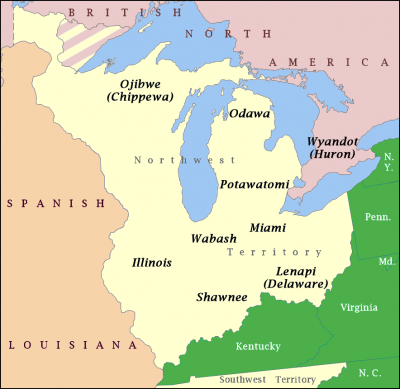St. Clair's defeat, also known as the Battle of the Wabash, the Battle of Wabash River or the Battle of a Thousand Slain, was a battle fought on 4 November 1791 in the Northwest Territory of the United States. The U.S. Army faced the Western Confederacy of Native Americans, as part of the Northwest Indian War. It was "the most decisive defeat in the history of the American military" and its largest defeat ever by Native Americans.The Native Americans were led by Little Turtle of the Miamis, Blue Jacket of the Shawnees, and Buckongahelas of the Delawares (Lenape). The war party numbered more than 1,000 warriors, including many Potawatomis from eastern Michigan. The opposing force of about 1,000 Americans was led by General Arthur St. Clair. The forces of the American Indian confederacy attacked at dawn, taking St. Clair's men by surprise. Of the 1,000 officers and men that St. Clair led into battle, only 24 escaped unharmed. As a result, President George Washington forced St. Clair to resign his post, and Congress initiated its first investigation of the executive branch.
The Northwestern Confederacy, or Northwestern Indian Confederacy, was a loose confederacy of Native Americans in the Great Lakes region of the United States created after the American Revolutionary War. Formally, the confederacy referred to itself as the United Indian Nations, at their Confederate Council. It was known infrequently as the Miami Confederacy since many contemporaneous federal officials overestimated the influence and numerical strength of the Miami tribes based on the size of their principal city, Kekionga.
The confederacy, which had its roots in pan-tribal movements dating to the 1740s, formed in an attempt to resist the expansion of the United States and the encroachment of American settlers into the Northwest Territory after Great Britain ceded the region to the U.S. in the 1783 Treaty of Paris. American expansion resulted in the Northwest Indian War (1785–1795), in which the Confederacy won significant victories over the United States, but concluded with an U.S. victory at the Battle of Fallen Timbers. The Confederacy became fractured and agreed to peace with the United States, but the pan-tribal resistance was later rekindled by Tenskwatawa (known as the Prophet) and his brother, Tecumseh, resulting in the formation of the Tecumseh's confederacy.

1791Nov, 4
The Western Confederacy of American Indians wins a major victory over the United States in the Battle of the Wabash.
Choose Another Date
Events on 1791
- 14Aug
Haitian Revolution
Slaves from plantations in Saint-Domingue hold a Vodou ceremony lead by houngan Dutty Boukman at Bois Caïman, marking the start of the Haitian Revolution. - 21Aug
Haitian Revolution
A Vodou ceremony, led by Dutty Boukman, turns into a violent slave rebellion, beginning the Haitian Revolution. - 26Aug
Steamboat
John Fitch is granted a United States patent for the steamboat. - 14Sep
Avignon
The Papal States lose Avignon to Revolutionary France. - 27Sep
France
Jews in France are granted French citizenship.

 English
English  español
español  français
français  português
português  русский
русский  العربية
العربية  简体中文
简体中文 